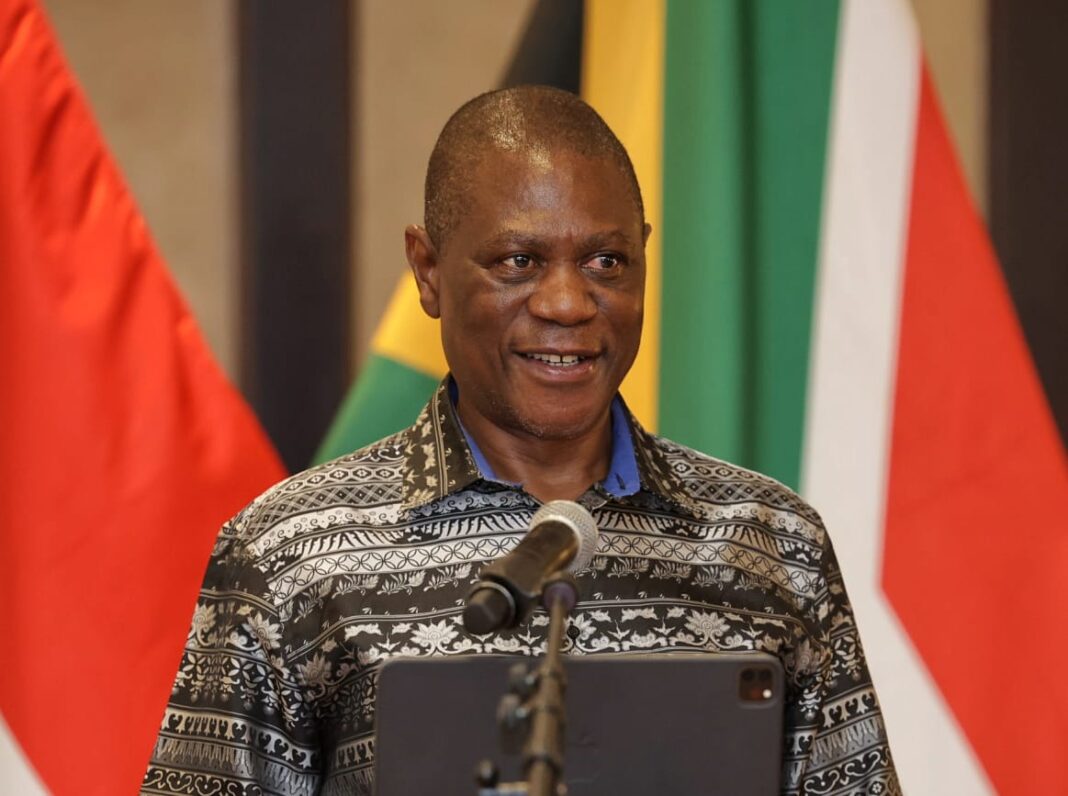By Johnathan Paoli
Deputy President Paul Mashatile has underscored the vital role of organised labour in shaping South Africa’s socio-economic landscape, praising the importance of its defence of workers amidst ongoing challenges of inequality, job losses and uncertain employment.
“The labour movement, as the backbone of our nation, holds the power to drive South Africa’s economic transformation. Together, through collaboration and collective action, we can overcome the challenges of the 21st century and create a future of dignity, equality, and prosperity for all workers,” he said on Tuesday.
Mashatile was speaking at the National Economic Development and Labour Council annual Organised Labour School in Pretoria. The theme was “Building Trade Union Activism for Better Wages and Working Conditions”.
He said the event provided a platform to reflect on the labour market, celebrate achievements and address ongoing challenges.
Mashatile praised the enduring partnership between government and organised labour over the past 30 years, crediting this collaboration for transformative strides, including the introduction of the minimum wage, employment equity progress and improved social protections for workers.
He said collaborative efforts through Nedlac have fostered an environment where worker advocacy aligned with national development goals, promoting stability and shared prosperity.
Mashatile emphasised the need for innovative solutions to strengthen the economy, enhance governance and improve social cohesion.
The deputy president lauded initiatives such as expanded Unemployment Insurance Fund benefits, fairer labour dispute resolutions and enhanced workplace safety regulations, which were instrumental in mitigating the impact of the Covid-19 pandemic.
He urged unions to leverage upcoming events, such as the G20 Summit and National Dialogue, to shape South Africa’s future and advocate for global social justice.
The Congress of SA Trade Unions made a rallying call for South Africa’s labour movement to act decisively in addressing the nation’s pressing socio-economic challenges.
Cosatu president Zingiswa Losi emphasised the pivotal role of organised labour in safeguarding workers’ rights and fostering economic stability through social dialogue.
“The challenges facing our country are significant, but we have the collective power and wisdom to overcome them. We must work together, united in our determination to promote the interests of workers and our communities,” Losi said.
Nedlac, she noted, has been instrumental in securing landmark victories, including the National Minimum Wage, labour protections for vulnerable workers, and the R65 billion Covid-19 relief fund for over 5.7 million workers
She said continued participation in its forums was essential.
However, Losi did paint a sobering picture of South Africa’s current challenges: unemployment exceeding 41%, escalating poverty and the deepening cost-of-living crisis.
She pointed to failing state-owned enterprises (SOEs) like Eskom and Transnet and collapsing local municipalities as urgent issues requiring innovative, collective solutions.
Labour must push back against austerity policies that disproportionately affected the poor, Losi said.
She called for reforms to strengthen governance in SOEs, expand public employment programmes and address pension fund defaults affecting over 7000 employers.
Losi praised advancements, including improved pension reforms and industrial interventions, but stressed the need for labour’s active role in shaping economic policies, such as AGOA renewal and industrial master plans.
The Cosatu leader urged unions to unite in strengthening their presence in Nedlac forums, proposing a clear, actionable programme to defend workers’ rights, improve public services and tackle unemployment.
The Federation of Unions of South Africa similarly highlighted the pressing need to strengthen trade union activism amidst persistent challenges such as wage inequality, unemployment and exploitative workplace practices.
Speaking at the event, Fedusa general secretary Riefdah Ajam outlined the importance of labour in South Africa’s socio-economic development.
“Fedusa reiterates the need for organised labour and our social partners to defend and expand collective bargaining as the cornerstone of activism for better wages and working conditions,” Ajam said.
She reaffirmed Fedusa’s commitment to collective bargaining as a cornerstone of worker advocacy and called for intensified grassroots mobilisation, stronger bargaining unit support and enhanced coordination among federations to amplify labour’s collective voice.
A significant concern raised was the backlog in South Africa’s labour courts, which Ajam described as “a critical bottleneck in delivering justice”.
Fedusa proposed urgent measures, including dedicated task teams to address inefficiencies and unsafe conditions at the Gauteng Labour Court, where urban decay and crime further hinder operations.
Addressing systemic wage disparities, Ajam championed the pursuit of a living wage benchmarked against inflation and emphasised the need for gender pay parity through workplace audits.
She criticised austerity policies for exacerbating inequality and called for labour’s active engagement in legislative processes to oppose harmful budget cuts.
Ajam called for renewed labour activism to build an equitable society saying that workers were the backbone of national development, and Fedusa’s advocacy must reflect their dignity and rights.
INSIDE POLITICS

